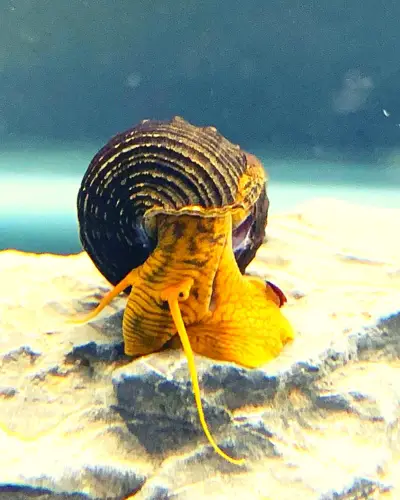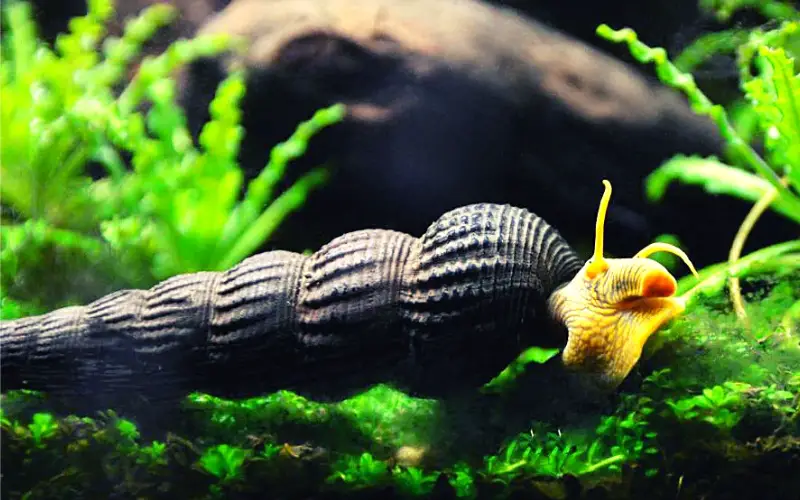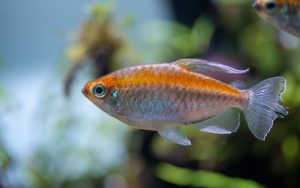Is My Snail Sleeping or Dead? Having a rabbit snail not moving in your aquarium can be concerning for any fish hobbyist. These slow-moving creatures are known for their unique appearance and beneficial role in cleaning up algae and debris in the tank.
However, if you notice your rabbit snail staying in one spot for an extended period of time, it may be a sign of an underlying issue.
In this ultimate snail care guide, we will discuss some common reasons why your rabbit snail may not move in your aquarium and provide troubleshooting tips to help you address the problem.

From water quality issues to potential health concerns, we will explore the factors that could affect your snail’s mobility.
By understanding the potential causes and implementing the necessary solutions, you can help ensure the health and well-being of your elephant snail in your aquarium.
Table of Contents
ToggleDo Rabbit Snails Sleep?
Rabbit snails are freshwater snails known for their unique appearance and peaceful nature. Many hobbyists wonder if these snails sleep, as they can often be seen motionless for long periods. The answer is yes: rabbit snails do sleep.

They may rest at the bottom of the tank, tucked away in the substrate, or on a java fern plant to conserve energy.
It is not uncommon for elephant snails to stay still for several hours, especially during the day. This rest period is essential for their well-being, allowing them to recharge and continue their activities in the tank.
While seeing a rabbit snail motionless may be concerning, it does not necessarily mean it is dead or dying. It is essential to observe their operculum to check for signs of life. If the operculum is tightly sealed, the snail is likely just resting.
Troubleshooting Tips: Why is My Rabbit Snail Not Moving?
Rabbit snails can be dramatic! They’re known for long rest periods, so don’t panic immediately. Here are some reasons your rabbit snail might not be moving:
Resting: This is the most likely scenario. Rabbit snails can burrow or stay tucked away in their cone shaped shells for extended periods.
Water Conditions: Rabbit snails prefer hard, alkaline water (pH 7 or higher) with plenty of calcium for their shells. Check your water parameters and adjust them if necessary.
Water Temperature: They thrive in warmer water, ideally between 78-82 degrees Fahrenheit (25-28 degrees Celsius).
Food Source: While they may eat some fish food, such as algae wafers and fish flakes, elephant snails are herbivores. Ensure they can access blanched vegetables like zucchini, spinach, or carrots.
New Environment: If you recently acquired your rabbit snail, adjusting to its new surroundings and tank size is taking time.
Here’s how to troubleshoot:
- Observe the Snail: Is it wholly withdrawn or just the foot? A withdrawn body with a sealed operculum (the trapdoor on the shell) might indicate a problem.
- Check the Shell: Look for cracks or deterioration, which could signal poor water quality or lack of calcium.
- Temp and Water Test: Ensure the right temperature and test your water for pH, ammonia, nitrites, and nitrates.
- Offer Food: Place a blanched vegetable slice in the tank and see if the snail emerges to eat.
If you’re still worried, gently nudge the shell with a soft object. A healthy snail should retract further inside. It might be deceased if there’s no reaction and the snail smells terrible.
What is The Behavior of a Rabbit Snail?
Rabbit snails are exciting additions to a freshwater aquarium because they combine a peaceful demeanor and an active lifestyle.
Here’s a breakdown of their typical behavior:
- Peaceful and Curious: Rabbit snails are not aggressive and tend to mind their own business. They’ve even been described as curious, exploring their environment with long tentacles.
- Active Scavengers: These snails snail snails are constantly on the move, sifting through the aquarium substrate (the gravel or sand at the bottom) in search. Scavenging helps clean the tank by breaking down uneaten food and waste products.
- Day and Night Activity: Rabbit snails are unlike some strictly nocturnal snails. They can be seen hurrying during the day and might even continue at night.
- Diet: While they graze on algae and biofilm, rabbit snails are also detritivores, meaning they eat detritus – organic matter like decaying plants and fish waste. Supplements like sinking pellets or blanched vegetables can also be part of their diet ].
Overall, rabbit snails are fascinating to watch and contribute to a well cycled aquarium environment through their cleaning habits.
Commonly Asked Questions about why Rabbit Snail is Not Moving (FAQs)
Why is Rabbit Snail not moved in 3 days?
Rabbit snails can rest for several days. It’s normal! Check for movement in the foot or the smell of a dead snail (foul odor). If worried, try placing it near food.
What is wrong with my rabbit snail?
Possible causes for rabbit snail issues include poor water quality, inadequate diet, stress, disease, or improper tank conditions. Consult a veterinarian or experienced aquarist for a proper diagnosis and treatment.
Do rabbit snails move?
Yes, rabbit snails are mobile! They use a muscular foot to glide and explore their environment, often grazing on algae and biofilm.
Do rabbit snails move a lot?
Rabbit snails can be moderately active grazers, cruising the tank for algae and leftover food. They may have rest periods, burying in the substrate or staying still for a day or two.
How do you fix a rabbit snail shell?
Unfortunately, broken snail shells can’t be fixed. But you can improve their environment to aid growth! Add calcium-rich foods and consider cuttlebone for extra minerals.
What conditions do rabbit snails like?
Rabbit snails thrive in warm, hard water with plenty of calcium for their shells. They like grazing on algae and mulm, making them significant algae cleaners for aquariums.
What is the white stuff coming out of my rabbit snail?
The white stuff from your rabbit snail could be reproductive matter, waste, or a sign of stress/injury. Observe behavior for clues. If passive, cloudy, or bad smell, consult a vet, aquarium specialist, or Planted Tank Forum.
Can an assassin snail kill a rabbit snail?
Yes, assassin snails can kill elephant snails, especially young or weak ones. They use a foot lure and radula to overpower prey. However, a giant, healthy adult snails rabbit snail might be safe.
Conclusion
In conclusion, the world of aquatic creatures is fascinating, filled with countless species that captivate and amaze us. From colorful fish to delicate sea anemones, each creature plays a vital role in maintaining the delicate balance of our underwater ecosystems. However, the rabbit snail holds a special place among these marvelous beings.
With its unique appearance and gentle nature, the elephant snail has enchanted many aquarium enthusiasts. Its slow and deliberate movements add a sense of tranquility to any planted tank, providing a mesmerizing sight for novice hobbyists and seasoned experts alike. However, there may be times when you observe your rabbit snails not moving. Don’t panic! Remembering that these snails have their own pace and rhythm, adapting to their surroundings is essential.
If your Yellow rabbit snail not moving, ensure the water parameters are suitable and provide a balanced diet. Patience is vital when dealing with these magnificent creatures. So, please sit back, observe, and let nature take its course.
You might also like
- Do Rabbit Snails Eat Algae: You WON’T Believe What They Do!
- Do Rabbit Snails Reproduce Asexually: (The Shocking Truth)
- Rabbit Snail Tank Size 101: Setting Up the Perfect Aquarium
- Golden Rabbit Snail 101: Tank Requirements & Care Tips
- How Long Do Rabbit Snails Live: (A Complete Care Guide)
- Do Rabbit Snails Eat Plants in Aquarium: (Experts Advice)
- Keeping Rabbit Snail with Betta Fish Happy (5 Proven Tips)
- Are Rabbit Snails Asexual: 3 Easy Ways to Breed Them!




